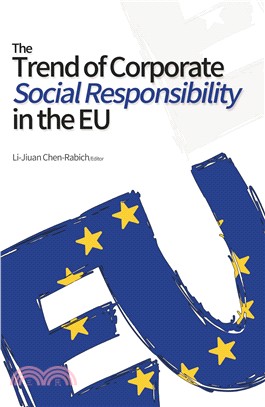The Trend of Corporate Social Responsibility in the EU
商品資訊
系列名:專業叢書(PS)
ISBN13:9789869607131
出版社:淡江大學出版中心
作者:Li-Jiuan-Chen-Rabich
出版日:2018/08/24
裝訂/頁數:平裝/249頁
規格:23cm*15cm*1.6cm (高/寬/厚)
商品簡介
作者簡介
序
目次
相關商品
商品簡介
歐盟歷經一甲子以上的統合發展,至今仍屹立不搖,歐盟結合了28個會員國的經濟實力,且已經成為全球最大的經濟實體,在國際經貿社會舉足輕重,並扮演領頭羊的角色。
本書詳細闡述歐盟企業社會責任的新趨勢,內容新穎,可供我國政府、產業界與學術界研究歐盟貿易政策的參考。
本書詳細闡述歐盟企業社會責任的新趨勢,內容新穎,可供我國政府、產業界與學術界研究歐盟貿易政策的參考。
作者簡介
Prof. Dr. Li-Jiuan Chen-Rabich, LL.M
- is currently director of Graduate Institute of European Studies and director of Center for European Union Studies.
- was awarded Jean Monnet Chair on European Trade Law from 2015 to 2018.
- is currently director of Graduate Institute of European Studies and director of Center for European Union Studies.
- was awarded Jean Monnet Chair on European Trade Law from 2015 to 2018.
序
It is an honor to take place the third-year Jean Monnet Chair conference at Tamkang University in Taipei.
The Corporate Social Responsibility (CSR) has a comprehensive content. CSR has become a widespread topic in business and public discussion. CSR covers interests of companies, consumers and
stakeholders. Responsibility aspects have already been integrated into the strategic management in many companies.
First of all, thanks to the EU’s cofounding for this international conference. CSR is currently a global issue. The EU has actively engaged in the CSR since 1995 not only through its reform of the company
law and financial market law, but also through raising awareness and understanding of CSR among stakeholders and the general public.
CSR has become a more important issue after the global financial crisis in 2008. The EU published a new policy on CSR in 2011. Enterprises have to behave themselves to integrate social, environmental,
ethical and human rights concerns into their business operations and core strategy in close collaboration with their stakeholders in order to fully meet their social responsibility.
The German legal system is a model of the continental legal system and has a great influence in Japan, Korea and Taiwan. The interaction between the EU and Germany is increasingly close due to the Germany’s membership and the loyalty to the EU. The EU’s CSR has an indirect influence on the three countries by the linkage with the German legal system.
It is a great pleasure and honorable to have the opportunity of sharing the CSR practices from Japan, Korea and Taiwan. There are seven papers related to the CSR practice in Japan, Korea and Taiwan under aspects of corporation law, labor protection and consumer protection.
The EU plays a global actor for a long time. Trade is an important instrument for global governance and implementing the European value.
The EU has an exclusive competence for the common trade policy. The EU has recently concluded comprehensive free trade agreements with most trade partners. This type of free trade agreement is so-called new generation trade agreement. The new generation trade agreement also
includes CSR value. Another five papers will be presented CSR under the aspect of the global governance.
The Corporate Social Responsibility (CSR) has a comprehensive content. CSR has become a widespread topic in business and public discussion. CSR covers interests of companies, consumers and
stakeholders. Responsibility aspects have already been integrated into the strategic management in many companies.
First of all, thanks to the EU’s cofounding for this international conference. CSR is currently a global issue. The EU has actively engaged in the CSR since 1995 not only through its reform of the company
law and financial market law, but also through raising awareness and understanding of CSR among stakeholders and the general public.
CSR has become a more important issue after the global financial crisis in 2008. The EU published a new policy on CSR in 2011. Enterprises have to behave themselves to integrate social, environmental,
ethical and human rights concerns into their business operations and core strategy in close collaboration with their stakeholders in order to fully meet their social responsibility.
The German legal system is a model of the continental legal system and has a great influence in Japan, Korea and Taiwan. The interaction between the EU and Germany is increasingly close due to the Germany’s membership and the loyalty to the EU. The EU’s CSR has an indirect influence on the three countries by the linkage with the German legal system.
It is a great pleasure and honorable to have the opportunity of sharing the CSR practices from Japan, Korea and Taiwan. There are seven papers related to the CSR practice in Japan, Korea and Taiwan under aspects of corporation law, labor protection and consumer protection.
The EU plays a global actor for a long time. Trade is an important instrument for global governance and implementing the European value.
The EU has an exclusive competence for the common trade policy. The EU has recently concluded comprehensive free trade agreements with most trade partners. This type of free trade agreement is so-called new generation trade agreement. The new generation trade agreement also
includes CSR value. Another five papers will be presented CSR under the aspect of the global governance.
目次
Preface ..................................................................................................iii
1. CSR in the EU’s Financial Market Law
Li-Jiuan Chen-Rabich............................................................................................ 1
2. Toward Open Shareholders’ Meetings
Maki Saito.............................................................................................................. 7
3. CSR and Data Protection: Recent Development in Taiwan
Lung-Sheng Chen, Hsiang-Yang Hsieh................................................................ 21
4. CSR vs “Business and Human Rights” Approach with Some Experiences in Korea
Sang-Soo Lee........................................................................................................ 33
5. Corporate Social Responsibility and Social Enterprises: A Comparative Study between Taiwan and the United Kingdom
Ta-Wei Kuo.......................................................................................................... 59
6. On Policy Guideline and Corporate Social Responsibility through Financial Tsunami: The Case of Taiwan
Hsin-Chang Lu.................................................................................................... 83
7. Driving Corporate Social Responsibility through the European Corporate Law: An Overview of Consumer Protection
Yen-Te Wu.......................................................................................................... 107
8. Corporate Social Responsibility and International Trade: The EU’s Trade Policy and Trade Agreements
Takao Suami....................................................................................................... 143
9. Comparative Analysis of Trade-Labour Linkage in FTAs of the US and EU
Yoo-Duk Kang, Bomin Ko................................................................................. 163
10. Personal Information Protection and Management: Taiwan’s Perspectives
Po-Yu Su............................................................................................................. 201
11. Introduction on Policies to Promote the Development of Social Innovation Enterprises in Taiwan
Shu-Chun Liao................................................................................................... 211
12. Nachhaltige Entwicklung und Grune Wirtschaft : Entwicklung und Ergebnisse im Bereich des Energiesektor
Wilson Hong...................................................................................................... 229
1. CSR in the EU’s Financial Market Law
Li-Jiuan Chen-Rabich............................................................................................ 1
2. Toward Open Shareholders’ Meetings
Maki Saito.............................................................................................................. 7
3. CSR and Data Protection: Recent Development in Taiwan
Lung-Sheng Chen, Hsiang-Yang Hsieh................................................................ 21
4. CSR vs “Business and Human Rights” Approach with Some Experiences in Korea
Sang-Soo Lee........................................................................................................ 33
5. Corporate Social Responsibility and Social Enterprises: A Comparative Study between Taiwan and the United Kingdom
Ta-Wei Kuo.......................................................................................................... 59
6. On Policy Guideline and Corporate Social Responsibility through Financial Tsunami: The Case of Taiwan
Hsin-Chang Lu.................................................................................................... 83
7. Driving Corporate Social Responsibility through the European Corporate Law: An Overview of Consumer Protection
Yen-Te Wu.......................................................................................................... 107
8. Corporate Social Responsibility and International Trade: The EU’s Trade Policy and Trade Agreements
Takao Suami....................................................................................................... 143
9. Comparative Analysis of Trade-Labour Linkage in FTAs of the US and EU
Yoo-Duk Kang, Bomin Ko................................................................................. 163
10. Personal Information Protection and Management: Taiwan’s Perspectives
Po-Yu Su............................................................................................................. 201
11. Introduction on Policies to Promote the Development of Social Innovation Enterprises in Taiwan
Shu-Chun Liao................................................................................................... 211
12. Nachhaltige Entwicklung und Grune Wirtschaft : Entwicklung und Ergebnisse im Bereich des Energiesektor
Wilson Hong...................................................................................................... 229
主題書展
更多
主題書展
更多書展今日66折
您曾經瀏覽過的商品
購物須知
為了保護您的權益,「三民網路書店」提供會員七日商品鑑賞期(收到商品為起始日)。
若要辦理退貨,請在商品鑑賞期內寄回,且商品必須是全新狀態與完整包裝(商品、附件、發票、隨貨贈品等)否則恕不接受退貨。
























